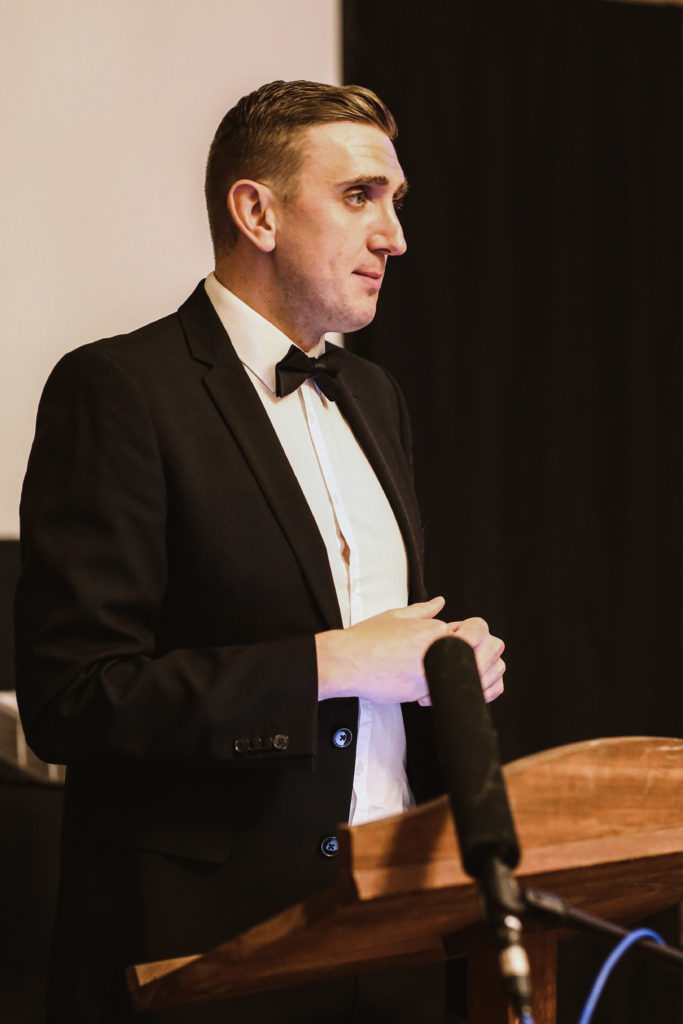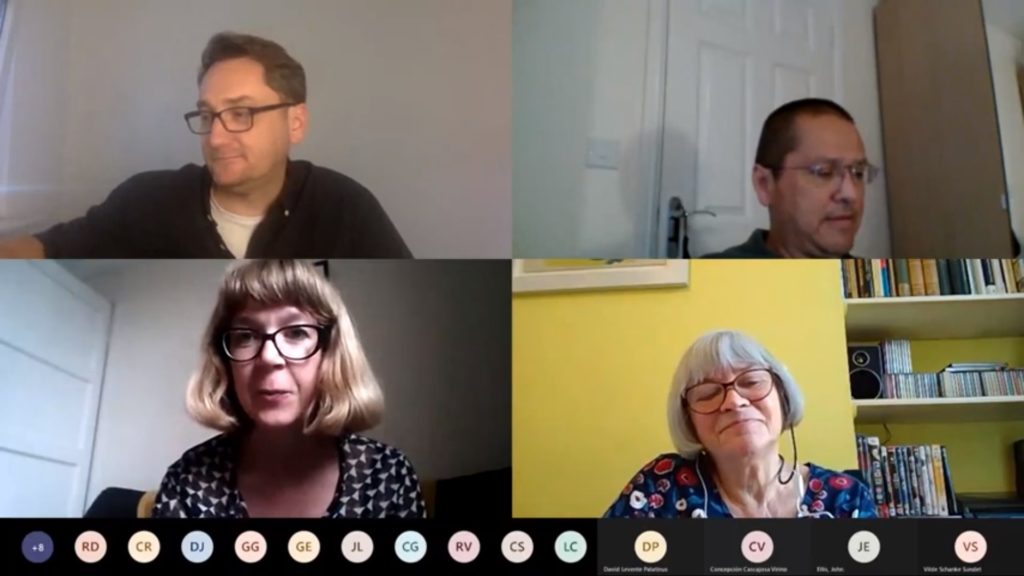Upcoming events
Seminar Series
We are introducing a series of online lunchtime seminars on all things television and beyond. Please join us for these short presentations, then met by your questions and answers.
Critical Awards in Television (CATs) 2024

The Critical Awards in Television are meant to disrupt the value systems we use to judge television. Television fulfils many important functions in our lives as audiences, but it also requires a significant amount of different creative skillsets which are often overlooked by traditional awards. We want to celebrate television for its diversity and its many different skillsets by drawing on debates had by the public, the academy and the industry about what is valuable about television.
The Awards Ceremony will take place at Edge Hill University in April 2024.
Critical Studies in Television Slow Conference
24 June – 5 July 2024
Television and Sustainability

This year’s theme is all about the UN’s Sustainable Development Goals. How can we make television more equitable? How can it be used as a tool in the fight against climate change.
Past events
Critical Studies in Television Conference,
5-7 July 2023 (blended)
Behind the Scenes and Screens: People and Power in Television was the theme of the 2023 conference which took place at Edge Hill University. To find out more and watch the recordings of the sessions, please see here.
Critical Studies in Television Slow Conference,
27 June-15 July 2022 (online)
Television has been widely theorised in relation to the everyday, the habitual and the repetitive. But there are a lot of phenomena that are surprising, and that require TV scholars to provide nuance to these observations. Take Squid Game (Netflix, 2021) which was supposedly the streaming hit of the year 2021 in the UK and elsewhere. But as an example of a Korean TV drama, it is highly unusual. Similarly, when we asked British audiences what programme gave them the most comfort during Covid, Grayson’s Art Club (Channel 4, 2020), a small, participatory and community-focused programme was voted winner of the Critical Awards in Television, instead of any of the expensive dramas that television critics spent so much time reviewing and writing about. There are stories to be told that need telling and that we don’t hear enough about because while television is complex and mutable, discussion of it remains entrapped with longstanding cultural hierarchies. On the other side of the spectrum is a subject area that still worries about its legitimacy and hence continues to produce more publications on high-end productions such as Game of Thrones (HBO, 2011-2-19) over those that, in the daily lives of audiences, might actually play a more important role, such as the different versions of Strictly Come Dancing (BBC, since 2004), including Dancing with the Stars (ABC, 2005). Thus, we want to put a particular focus this year at the Critical Studies in Television Conference at the outliers of television (studies). This includes, but is not restricted to:
- Overlooked programmes
- Aspects of television as a medium that have not attracted enough attention
- Different forms of television
- Innovative ways of working
- Surprising audience behaviour
- Marginalised voices
- Failures of television (studies)
- The invisible in television (studies)
Confirmed speakers
Rowan Aust is Lecturer in Television Studies and Production at the University of Huddersfield. Her research looks at care practices in film and television production. She is also Co-Director of SMTJ (sharemytellyjob.com) which advocates for parity in film and TV work, and runs The Time Project (www.thetimeproject.co.uk), an hours and rates app designed to highlight inequalities in the film and TV industries. She has been published in Alphahville, CST, and various edited collections and has authored and co-authored industry-facing reports.

Steve Smith is a BAFTA award winning television director and has taken the creative lead on numerous projects to help create some of the UK’s most popular television programmes. With over 30 years production experience in which he’s directed, produced and executive produced shows, working on a wide range of programmes across several genres.
He is the former Chair of Directors UK, a BAFTA Albert Ambassador and environmental production consultant teaching sustainable activities in all aspects of programme-making and a board member at Elstree Film Studios where he leads on sustainability and net zero strategy.
In 2019, Steve co-founded Picture Zero Productions, focusing on producing engaging, innovative, and entertaining content on climate change and solutions.

Marta Lopera-Mármol is a PhD candidate at the Communication Department at Pompeu Fabra (UPF). She is a researcher of the Communication, Advertising and Society group under the Media Psychology and Psychophysiology section, where she obtained a scholarship to undertake her PhD. She is currently a visiting scholar at Cambridge University (Cambridge, UK) at the Faculty of Modern & Medieval Languages and Linguistics and a member of King’s College. Marta did a PhD research stay at the Sorbonne Nouvelle III (Paris, France). She obtained an MPhil in Communication Research at UPF. Marta has a B.A. in Audio-visual Communication with a minor in Marketing and Management from the University of Barcelona (UB) with two International academic stays at Hanzehogeschool of Applied Sciences (Groningen, The Netherlands) and La Trobe University (Melbourne, Australia). She has participated in two Spanish Ministry research projects, a European one, published several book chapters and articles for peer-reviewed journals and taught in the undergraduate Journalism and Public Relations & Advertising programs at UPF. Her research focuses on television series, media sustainability, mental disorders, youth and Brit-grit aesthetics. Currently, she co-leads alongside Dr. Manel Jiménez a project on Green Shooting and Media Sustainability framed under the Planetary Well-Being (UPF).

Manel Jiménez-Morales is currently the vice-rector of Educational Transformation, Culture and Communication at Pompeu Fabra University-Barcelona (UPF). He holds a degree in Audiovisual Communication from UPF and in Literary Theory and Comparative Literature from the University of Barcelona, and has a PhD in Social Communication from Pompeu Fabra University.
Manel has combined his work as an academic with several projects in the audiovisual industry. He has been on several international research exchanges (University of Oxford, UCLA, BFI) and has taught at various international universities. Apart from leading some research projects, Manel started to develop the strategy for MOOCs and new educational formats at UPF and is entrusted with the incorporation of new technologies into teaching. He was also the director of the Centre for Learning Innovation and Knowledge at UPF.

The Critical Awards in Television 2021
We celebrated for the first time television from our unique perspective. This included celebrating television that had cleverly made use of Covid restrictions to tell even more compelling stories, giving audiences a sense of comfort and celebrating future television makers.

The full video of the Award Ceremony is available here.
The Critical Studies in Television Slow Conference 2021
In 2021, the CST Conference was focused on how television studies needed to change as a result of the many disruptions that television itself was experiencing.
The conference brought researchers from the whole world together and was held online.

The full conference can be re-watched here.
Privacy in the Wild: Why the Privacy Interests of Animals Matter, a webcast with Brett Mills. 25 May 2021
This panel program will examine how privacy concepts can inform both our understanding of animals and our efforts to improve animal welfare and conservation. Topics discussed will include publishing geolocation data for imperilled species, intersections of human and animal surveillance, ethical concerns with filming animals in the wild, and how existing laws acknowledge (and ignore) animal privacy interests. The event is hosted by the New York City Bar.
Research Seminar, 19 May 2021
Anthropocentric Storytelling: Towards Thinking Beyond the Human in Television Studies
Brett Mills speaks to the research community about his vision of a television studies that moves beyond the confines of anthropocentrism.
100 Years of Women at the BBC, 7 May 2021
This symposium shone a light on the role of women in the BBC. It brought together researchers from across the UK.
